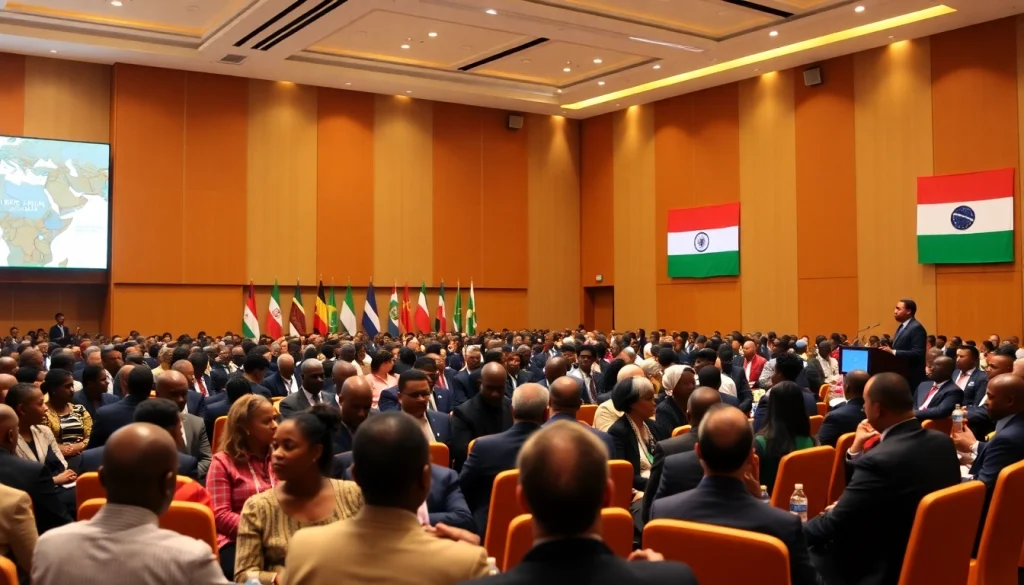Engaging Insights into the BRICS Africa Partnership: Building a Shared Future

The Emergence of the BRICS Africa Partnership
In recent years, the BRICS Africa partnership has become a formidable player on the global stage, presenting new avenues for economic development and collaboration. This alliance, which includes Brazil, Russia, India, China, and South Africa, embodies a collective effort to redefine the terms upon which global economic relations are based. African nations have been keen to engage in this partnership for multiple reasons. Not only does it promise access to vital investment, but it also offers a platform from which African nations can influence global policymaking. Understanding the intricacies of this partnership begins with a closer look at its origins and objectives.
Understanding BRICS: Origins and Objectives
The BRICS grouping originated in the early 2000s, driven by the objective to enhance cooperation among emerging economies. Over the years, BRICS has evolved from an economic association focused mainly on trade into a comprehensive platform addressing global issues such as poverty alleviation, sustainable development, and climate change. The BRICS countries collectively command significant global resources, which they leverage to boost their economic agenda.
The Role of Africa in Global Partnerships
Africa’s role has long been perceived as that of a mere recipient of aid; however, the narrative has shifted remarkably in the 21st century. With resources like minerals, oil, and agricultural products, African nations are essential players in the global economy. The engagement with BRICS allows these nations to break free from traditional dependencies and seek more balanced partnerships. As the BRICS Africa partnership takes root, African nations are increasingly viewing it as a critical platform for assertive engagement in global affairs.
Historical Context of Africa’s Economic Engagement
The historical context surrounding Africa’s economic engagement reveals a complex tapestry woven with colonial ties, exploitative practices, and a drive toward independence. Post-independence, many African nations found themselves navigating a landscape dominated by Western powers, with limited options for partnership. The BRICS alliance presents an alternative model that emphasizes equal footing, enabling African nations to collaborate on their terms. This shift represents not just a strategic move for economic gain but a reinvention of how Africa is perceived in global discussions.
Key Benefits of the BRICS Africa Partnership
The BRICS Africa partnership stands to offer numerous benefits for African nations that are keen to lessen their economic vulnerabilities and bolster their standing in the global landscape. With a keen focus on resources, trade, and investment flow, here’s a closer examination of the potential advantages that arise from this unique collaboration.
Economic Growth Opportunities for African Nations
One of the most significant advantages of the BRICS alliance is the economic growth opportunities available to African countries. By partnering with BRICS nations, African economies can tap into vast markets and receive investment across a variety of sectors, including energy, technology, and agriculture. For instance, joint ventures in renewable energy projects can significantly reduce energy scarcity issues faced in many African regions.
Strategic Investments from BRICS Countries
Strategic investments from BRICS countries are becoming increasingly prevalent. China, for example, has drastically increased its investment in African infrastructure, funding roads, railways, and telecommunication projects. Such investments not only create jobs but also enhance connectivity, which is essential for fostering intra-African trade. The partnership with Russia has also seen investments in the health sector, where Russian aid has improved medical infrastructure in several African nations.
Trade Agreements and Their Impact on Local Economies
Trade agreements forged under the BRICS framework can have transformative impacts on local economies. These agreements often lead to reduced tariffs, improved market access, and trade facilitation measures, which collectively stimulate economic activity. The Economic Partnership Agreements (EPAs) and Free Trade Agreements (FTAs) can create a more dynamic trading environment for African nations, allowing them to enhance the export of goods and services globally, thereby increasing GDP growth.
Major Challenges Facing the BRICS Africa Partnership
Despite the potential benefits, the BRICS Africa partnership is not without its challenges. Political instability, economic disparities, and cultural barriers pose significant risks that could impede progress. Understanding these obstacles is crucial for both African countries and BRICS nations wanting to maximize the partnership’s benefits.
Political and Economic Instability Risks
Political instability remains a major concern for many African countries. Internal conflicts, governance issues, and corruption can hinder investor confidence and discourage potential collaborations. Furthermore, economic disparities among BRICS nations can lead to imbalances that affect trade dynamics. Countries like South Africa may find themselves in precarious positions when negotiating terms with larger economies like China and India.
Infrastructure and Logistic Hurdles
Lack of adequate infrastructure poses another significant hurdle. Many African nations still struggle with degraded transport networks and insufficient energy supplies, which in turn stifles economic growth and the progression of joint ventures. Addressing these logistical challenges requires substantial investment not only from BRICS nations but also from domestic governments in Africa.
Socio-Cultural Barriers to Integration
When building partnerships across diverse regions, socio-cultural barriers are prevalent. Attitudes toward foreign investment can vary widely among local populations, often leading to resistance. Additionally, different business practices and cultural nuances can complicate negotiations and cooperation. Recognizing these factors is essential for sustainable integration within the BRICS framework.
Success Stories and Case Studies
Gleaning insights from successful initiatives within the BRICS partnership provides valuable lessons for future projects. Several African nations have made strides in collaboration with BRICS countries, showcasing the immense potential of these partnerships.
Successful Projects within the BRICS Framework
A notable project under the BRICS alliance is the New Development Bank (NDB), which funds infrastructure and sustainable development projects within member countries. An impressive example is the renovation of major transport corridors in South Africa, which stands to enhance trade and economic efficiency. Additionally, China’s investment in the Addis Ababa-Djibouti railway illustrates the transformative potential of modern infrastructure supported by BRICS funding.
African Countries Making Strides in BRICS Initiatives
South Africa has positioned itself as a frontrunner in leveraging BRICS partnerships, strategically aligning its economic policies with initiatives that encourage foreign direct investment. The nation has successfully attracted billions of dollars in infrastructure investment aimed at addressing long-standing issues of energy shortage and unemployment. Similarly, Nigeria’s involvement in BRICS discussions has yielded fresh investments in the agricultural sector, bolstering its position in food security.
Lessons Learned from Collaborative Efforts
Successful collaboration often hinges on a few core principles: transparency, mutual benefit, and respect for local customs. Ensuring that African voices are heard in negotiations is paramount for fostering sustainable partnerships. Moreover, tracking performance metrics on economic returns, local employment rates, and social benefits from projects can provide invaluable feedback for future engagements.
The Future of the BRICS Africa Partnership
The future for the BRICS Africa partnership holds remarkable potential. As global power dynamics continue to shift, this alliance may play a pivotal role in shaping the economic landscape of the 21st century.
Predicted Trends in Global Economic Dynamics
As the world becomes increasingly multipolar, the BRICS bloc is expected to become a cornerstone of resistance against Western hegemony. We can foresee a rise in alternative economic models emphasizing sustainability and equity, significantly impacting Africa’s development path. This shift could turn the focus toward more inclusive economic practices that resonate better with the African context.
Potential Expansions of the BRICS Membership
The possibility of expanding BRICS membership could enhance the partnership’s effectiveness. Africa could see additional representation through countries like Egypt, Nigeria, and Algeria joining the bloc, thus increasing its influence and diversity. An enlarged BRICS could facilitate richer dialogue and collaboration, benefiting not only member states but also the broader global community.
Long-Term Vision for Sustainable Development
Ultimately, the BRICS Africa partnership must align with long-term sustainability goals. Engaging in eco-friendly projects, promoting technology transfers, and facilitating education initiatives can ensure that development meets the needs of current and future generations. With the right strategies in place, African nations can navigate these partnerships while enhancing their sovereignty and boosting their economies.
In conclusion, the BRICS Africa partnership stands at the intersection of opportunity and challenge. As African nations navigate this evolving landscape, the prospects for shared prosperity are bright, contingent upon constructive engagement and mutual respect across diverse cultures and economies.




